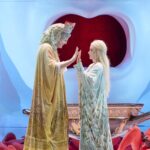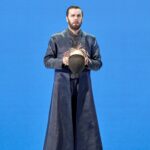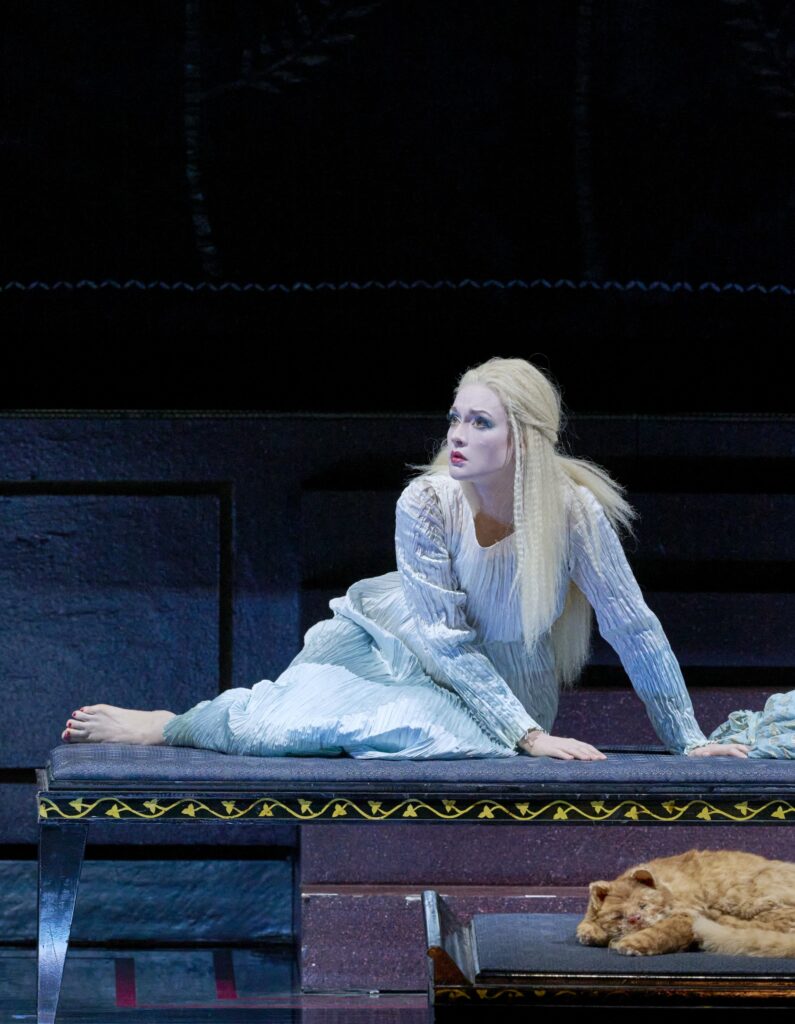Vienna State Opera Orchestra under Sebastian Wiegl excel in Strauss’ ‘pastoral symphony for stage.’ Achingly beautiful, the chorus of shepherds lamenting their toil is over; stay beautiful day, how long you have lingered. Vera-Lotte Boecker’s (Daphne) is a richly expressive soprano: You make the bushes and branches resplendent, my sisters; prophetic of her fate. She’s at one with nature: O bleib, geliebter Tag, stay beautiful day, don’t leave me yet. Boecker, blonde, porcelain white skin, nymph-like, she’s perfect.
She sings of the dear tree planted in her childhood years, a brother to her, foreseeing the present…A dark figure, a silhouette, shadows her movements: LEUKIPPOS (Daniel Jens), her ‘brother’, who eventually abuses her trust. Jens’ light tenor, a memorable performance, appears in a white summer suit, face whitened, other worldly. She loved his flute like the silvery wind. But for her it’s all over, after he siezed her in a passion, Leukippos, ‘once her playmate’.
The stage glows in an orange light, sunrise. Noa Beinhart’s Gaia, her distiguished contralto, at first feint, is dressed in a rich ruby-red gown. My child, I sent you out as a young sappling. She (Daphne) is to bloom in anticipation of the feat. One day the god will lead her, ‘back to her place on earth.’
Peneios, Daphne’s father, arrives with his herdsmen, and sings the praises of Olympia. So, surprisingly, Gunther Groissbäck is wearing a black dinner suit. Are you shepherds all with me now, he sings. But Groissbäck’s formidable bass isn’t projecting as it should.
Out of a black, alien mound, through a gold aperture, appears Apollo, like some spaceman! David Butt-Philip, tall, black-bearded, an imposing figure, is beautifully sung, but his arrival frightens the mortals. We hear of a bull who chased at the cows: premonitions of unnatural death.
Daphne rises from her couch in the ‘salon’, front of lower stage. In the ‘plot’, (Ovid’s Metamorphosis), the sight of her, Daphne, reminds Apollo of his sister Artemis, and he’s aroused, siezed by a great affection for her. Daphne is suspicious, especially as the ‘stranger’ Apollo sings he knows her very well. But Daphne, trusting a kindred soul, lays her head on his chest. But as in Ovid’s classical myths of gods co-habiting with mere mortals, it’s for sex any-which-way. Apollo kisses her passionately, and she tries to escape.
Anyway, Apollo sings flowers will grow through her; and that is how she will be loved. This kiss, this embrace – but you call yourself a brother? Apollo sings, ‘I love you Daphne,’ as he he descends from the upper stage to the couch bed (the psychoanalysts studio.)
For the celebrations for Dionysus, the god of raves, it’s carnival time. We audience are treated to a spectacular ballet, (Vienna compaserie).There’s a giant god’s head – is it a mask?; there are greek vases, and a gold chalice, amongst other effects. A follie too far? But the figure who seems to Daphne like a sister is …LEUKIPPOS; disguised, in drag, to take advantage of her.
In the (Ovid) story, when Daphne tries to remove the stranger’s (Leukippos’) mask, he gets violent, and pushes her down, to rape her. Apollo sees through Leukiposs’s disguise, furious that he’s violated their festival with contempt. Apollo ‘hurls thunderbolts’, Strauss’ music is now discordant, back to the radical Strauss of the Salome and Elektra period (1905,1908). ‘The god has entered his soul. He offers Daphne his love again.’
Boecker had stepped in for Hanna-Elisabeth Mueller at very short notice. I had first wondered if she had the stamina to hold up for two hours. But she, Boecker, has an impressive range, her soprano securely grounded.
Daphne sings of Leukippos, as if he’s offering her all the love in the world. But she can’t understand him. Apollo comes in on a storm, and destroys Leukoppos by lightning. He dared to love her, Daphne, but was struck down by a god. Daphne’s ‘summon me to the other side’ is sung by Boecker on an extraordinarily high note. Strident brass instruments, surging strings; neurotic, at the extreme end of Romanticism.
Are we still gods, or weighed down by human hearts’, sings Apollo. The Greek gods manipulated, and abused their mortal inferiors, but envied them for their human qualities, the empathy they were incapable of. 
He’s killed the most innocent…. Apollo, (not the god of hellfire!), reveals his identity, ‘I am Apollo, the god of the sun and daylight.’ Leukoppos curses him, for wooing Daphne in disguise, and is struck dead. Daphne mourns her erstwhile companion. She belonged to him, she sings. She rejects Apollo’s advances. In the mythology, Apollo begs the forgiveness of the gods for deceiving these mortals.
He sings, he will fulfill her dream, and she will blossom evergreen. He will transform her into a tree: bestow the greatest honour! Butt’s exceptional tenor is rich and authorative.
But Boecker is now sitting up; then, bemused, moves over to the stage with Apollo behind her. She stands upper stage against blue skies. A weird trunk shape, an abstract copper installation behind her, Daphne sings she’s coming home to her brother. How sweetly the sap of the earth flows through her. ‘Wind play with me! Birds of the air nest in me.’ She enters the burnished gold installation, which closes in on her. Her hand comes out stroking the trunk. We hear her voice, ethereal, Boecker’s wordless song fainting away.
The man is still sitting on the side of the stage. The couch is now empty. Truly a transformational experience. P.R. 18.9.2023
Photos: Daniel Jens (Leukippos), Vera-Lotte Boecker (Daphne); David Butt Philip (Apollo); Featured image: Ileana Tonca, Daniel Jenz, Alma Neuhaus © Michael Pöhn/ Wiener Staatsoper

